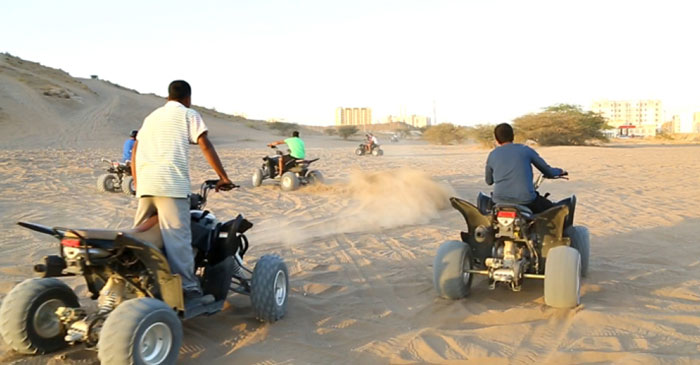
Muscat: A “Risk Management and Safety in Adventure Tourism” (RMSAT) programme has been launched by the Ministry of Tourism to encourage adventure sports and tourism activities in the country.
The programme is part of one of the 15 initiatives adopted by the Ministry of Tourism (MoT) within the national programme to promote economic diversification, which will be followed up by implementation support and a follow-up unit.
The programme was launched during a presentation prepared by the ministry in cooperation with supportadventure.co.nz, which is supervised by the New Zealand Government, and Maven International Consulting Company.
During the presentation, an adventure tourism activities guide that highlights the wadis (valleys) was also launched.
The guide includes a description of adventure tourism in wadis, the risk identification and management process, the mechanism of classifying wadis, the most prominent activities that can be carried out in wadis, and how to manage the risks, teamwork, activity practitioners, and types of equipment, accidents, and emergencies.
Sustainable tourism service
Sayyid Adil Al Busaidi, advisor on Tourism Affairs, Ministry of Tourism said, “The Sultanate has rich environmental and natural resources, which are of interest and wonder to divers across the GCC (Gulf Cooperation Council) and beyond. In keeping with the same, the RMSAT programme and guide are a sustainable tourism service initiative aimed at helping position the Sultanate as a world-class tourist destination in the adventure tourism sector.”
Shedding light on the main objectives of the initiative, Stephen Jones, development consultant at Oman Tourism Development Company (Omran), who is spearheading the project said, “We seek to support the adventure tourism sector in the Sultanate by providing a risk and safety management system that is clear, comprehensive and scientific.”
“One that contributes to ensuring that a provision is made for all required safety processes that reduces risks practically to the lowest possible level. All this, because one must not forget that the adventure tourism sector is linked to activities and risks that may reach a degree of danger, whether in the mountains, deserts, sea or in other places.”
Andrew Lawrence, consultant at the MoT said, “Oman has some of the best natural resources in the gulf for adventure tourism and it’s got huge potential to be seen as one of the main players in the world for that.
It’s got fantastic climate for it, and the weather is great. Also, its central location is a plus.”
Commenting on upcoming plans in terms of developing new routes for adventure activities, Lawrence said, “There’s a lot of potential to develop more routes; for example in trekking there is the Jabal Akhdar, Jabal Shams, there is a fantastic opportunity to create not just a single-day trek, but a multiple-days trek to do a trans-Hajr trek and the same opportunities are available in Musandam as well.”
“Adventure activities have a lot to do with awareness; of where you can actually do these activities, there are some publications that were released a number of years ago and even now there are some for off-road driving, which are very popular, but hopefully in the future we will be able to encourage developing a number of guide books for adventure activities.”
The adventure tourism industry in the world is growing exponentially at the moment and the latest survey says it will grow further.
Oman is trying to adapt the New Zealand model of developing risk management for adventure activities.
“We have got a wheel with the New Zealand model, which is great and the New Zealand government has been very cooperative in making all of their information available to us, it’s open source information so anybody can get this from their website. We are also looking at developing a cooperation agreement with the New Zealand government that is specifically related to adventure tourism.”
He further added that involvement of the Omani community is a major concern. “The Omani people are the main concern for us and the whole goal of tourism in itself is not only to develop an economy and revenue for the country, but to provide employment as well.”
“We have a vision that in the future there will be an Omani training system that’s accredited to international standards and linked to an Oman training qualification framework system so that Omanis can become internationally qualified in Oman itself.”
A team from the ministry will give a second presentation in the city of Khasab in Musandam province on March 29, followed by a third presentation in the city of Salalah in Dhofar on March 30.